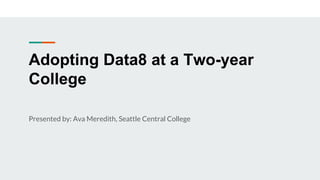Adopting data8 at a two year college
- 1. Adopting Data8 at a Two-year College Presented by: Ava Meredith, Seattle Central College
- 2. What is Data 8? ŌŚÅ Data 8 is a popular introductory Data Science class at UC Berkeley ŌŚÅ Designed to be accessible to a broad range of students without the typical prerequisites for a data science class ŌŚÅ Data 8's unique model combines inferential thinking, computatianl thinking, and focus on social issues into a single, introductory course ŌŚÅ All materials for the course are available for free online under a CC license.
- 3. Data 8 Goals ŌŚÅ Diversity ŌŚÅ Equity ŌŚÅ Pedagogical Clarity ŌŚÅ Scalability ŌŚÅ Depth ŌŚÅ No computational barrier to entry
- 4. Core Concepts ŌŚÅ Critical thinking ŌŚÅ Don't take your data for granted ŌŚÅ Use the combination of CS + Stats as a feature, not a bug ŌŚÅ Focus on hands on work ŌŚÅ Determine if your inference is sound ŌŚÅ Experiment ŌŚÅ Know the right statistical tools for the job
- 5. ŌŚÅ Learn about data limitations ŌŚÅ Quantify and understand uncertainty in data ŌŚÅ Turn your data analysis into a decision ŌŚÅ Think of ways that you could be wrong ŌŚÅ Consider edge-cases
- 6. ŌŚÅ Focus on main ideas (shield the students from non essential topics) ŌŚÅ Use the data science module rather than many package APIs ŌŚÅ Use JupyterHub (no need for students to setup environment)
- 8. ŌŚÅ Abstract cleaning data by providing pre-collected/cleaned data ŌŚÅ Provide further resources ŌŚÅ Aim the course for anybody, not just statistics or CS majors.
- 9. Intersections of Topics ŌŚÅ Intersectionality is a feature, not a bug ŌŚÅ Connect CS and statistics concepts ŌŚÅ Use interactivity to let people explore
- 10. Topics covered ŌŚÅ Programming fundamentals ŌŚÅ Statistics, sampling, and hypothesis testing ŌŚÅ Inference, prediction, and models ŌŚÅ Comparing distributions
- 11. Connector courses Connector courses offer the ways in which data science is applied in a domain knowledge field
- 12. Tech Stack ŌŚÅ Managing course content - Jupyter notebooks ŌŚÅ Programming language - Python 3 ŌŚÅ Primary data object and functions - Use of data analytics packages in Python (Data 8 wraps several) ŌŚÅ Handling the Python environment - Python dev environment managed with miniconda
- 13. Next Steps View the course online http://data8.org/ Free online textbook: https://www.inferentialthinking.com/chapters/intro Data Science Academic Resource Kit: https://data.berkeley.edu/education/ark












